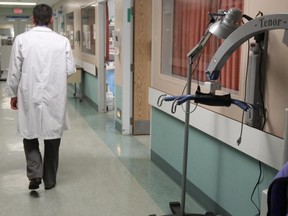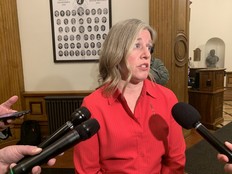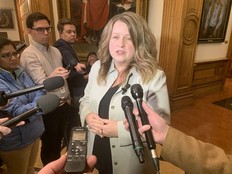Will a new tax actually see doctors leave?
Analysis: Federal budget plans to increase share of capital gains that are taxed and doctors are raising alarm

Article content
OTTAWA • The federal budget’s major tax change won’t cause any current doctor or professional to pack up and leave, says John Oakey, vice-president of taxation for the Chartered Professional Accountants of Canada.
However, the retirement savings of high-earning incorporated professionals will take a hit.
How much is up for debate, with experts disagreeing.
But the real concern, Oakey says, should be whether the latest in a series of tax changes risks becoming “the straw that breaks the camel’s back,” enough for new professionals to look for a more tax-friendly jurisdiction in deciding where to set up.
The Trudeau government’s federal budget plans to increase the share of capital gains that are taxed from 50 per cent to 66.7 per cent for individuals with more than $250,000 in capital gains in a year, and all capital gains realized by corporations.
The new revenue stream is projected to rake in $19.3 billion over the next five years from higher earners to pay for a multitude of new federal programs.
The cost of any fallout is what is now being raised.
The impact
When doctors, or other professionals who have created a corporation, earn income, instead of putting a portion of it toward a retirement savings plan, they often retain that money inside their corporation and invest it.
Those investments grow over time to become their retirement fund.
Now, if they sell their investments, they will face a higher inclusion rate on all capital gains they earn, including on retirement investments.
The higher rate kicks in on June 25.
The Canadian Medical Association maintains the change will put existing doctors’ retirement savings in jeopardy.
In an interview, president Dr. Kathleen Ross said the group’s internal calculations predict that the average doctor will lose an additional eight per cent of their retirement savings when it comes time to cash out.
On $2 million in savings, that’s $160,000 in new tax.
“It does feel like we are being unfairly treated,” Ross said.
That takes into account the increase in the inclusion rate, compared to what it was.
Ross contends doctors aren’t the country’s wealthiest 0.13 per cent with an average income of $1.42 million that the federal government contends its tax hike targets.
“We are not what the federal minister is classifying as ‘ultra wealthy,’” she said.
The latest annual report on physician compensation in New Brunswick shows the median billing amount of a physician was between $350,000 to $399,999 last year. That said, self-employed doctors also have to pay for overhead costs such as rent and staff salaries from that amount.
In New Brunswick, a total of 49 doctors billed more than $1 million, while another 1,767 doctors across the province billed under the $1-million mark last year.
Florence Jean-Jacobs and Randall Bartlett, two economists at Desjardins, said in a note to investors that the impact of the new measures will be felt differently across industries, with doctors not on a list of most impacted.
“In the absence of public data on capital gains by sector, the greater the assets (especially financial assets), the greater the risk that some of these industries could be affected by the changed inclusion rate for capital gains,” the report said.
“This is especially the case for financial corporations, which derive a not insignificant share of their profit from capital gains.”
They list banks, mutual funds, and money lenders as being hit hardest.
Further fallout?
Oakey said that he believes the proposed tax change won’t cause any current doctor or professionals to pack up and leave.
Those higher earners made a choice to create a corporation and manage their money inside of it.
They’re essentially stuck with that decision.
Physicians can still fully shield their retirement savings from capital gains taxation by selling off investments and open a registered pension plan. Contributions to the plan would be tax deductible, which means the individual would not pay any tax on the capital gains they earn.
But there are also limits on how much someone can contribute to a pension plan, which means physicians will still end up paying more taxes on personal investments.
“At some point in time you have to sell that asset in order to gain access to the cash to do something with it,” Oakey said.
Professionals could liquidate anything with accrued gains before the higher tax rate kicks in, but that means being taxed now, instead of in the future.
“But they can’t really avoid the tax,” he said.
University of Calgary economist Trevor Tombe argues the tax change “modestly improves the efficiency and equity of Canada’s tax system,” noting taxes are lower on capital gains than on wages.
Both Prime Minister Justin Trudeau and Finance Minister Chrystia Freeland have dismissed the doctors’ plea to reconsider the capital gains tax changes, arguing its tax dollars that will go towards paying for health care, a dental plan, a drug plan, and other programs.
“I think Canada’s health-care professionals recognize, maybe more than anyone else, how important these investments are,” Freeland said this past week.
“They are massive and I think it’s entirely appropriate, it’s really fair to ask those who are doing the best in our society to pay a little bit more to fund them.”
What about future doctors and professionals?
Ross said it matters to new-to-Canada and new-to-practicing physicians who want to establish a community practice.
“This is a disincentive to practicing here,” she said. “I think it is absolutely a challenge for us already to compete on the global market for physicians and other health care providers.
“This is a massive disincentive for physicians to come in and set up the types of practices, those community-based family practices in particular, that we need to provide health care to Canadians.”
Oakey added that he doesn’t think “it’s this one situation where doctors or others will say ‘that’s it, we’re out of here.
“But I think it’s an accumulation of tax changes that happened over the last few years,” he added.
“When you start putting them all together, it’s the old adage that ‘this is the straw that broke the camel’s back.’ This is one other reason, because there have been a number of tax changes over the last few years that have made the tax results of doctors having a corporate entity not as beneficial as it used to be.”
In the summer of 2017 there was a small business tax debacle when the Trudeau government aimed to tackle what became known as “income sprinkling,” where small business owners pass on paychecks to family members in efforts to pay lower taxes, the conversion of a private corporation’s regular income into capital gains, and passive investments inside private corporations.
There was outrage, including threats by doctors in New Brunswick and elsewhere to move their practice elsewhere.
Months later, the feds backtracked, slimming down changes to have a more targeted impact.
“That still reduced the tax effectiveness that doctors were relying on,” Oakey said.
“Trudeau was quoted at the time saying ‘small businesses were just a way of avoiding taxes.”
There’s been changes to income splitting rules and others to the refundable dividend tax on hand, Oakey said, another tax policy that applies to investment income earned in a corporation.
“There’s a number of tax provisions,” Oakey said.
“Each one in of themselves is not the end of the world, but when you cumulatively add them up you start making it so these corporate structures that doctors, lawyers, accountants and other professionals were relying on, they become less beneficial.”
He added: “If you keep changing the tax rules, it makes it very difficult for people to have faith in the system where you should be able to say ‘if I do this, 20 years from now this will be my outcome.’
“If you keep changing it, then people will start to look where the tax laws are a little more friendlier.”












Postmedia is committed to maintaining a lively but civil forum for discussion. Please keep comments relevant and respectful. Comments may take up to an hour to appear on the site. You will receive an email if there is a reply to your comment, an update to a thread you follow or if a user you follow comments. Visit our Community Guidelines for more information.